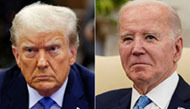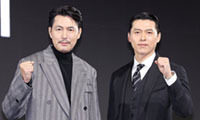Business Reporter
SEOUL - Jeffrey Jones, attorney at law for Kim & Chang, possibly the largest law firm in Korea, described the legal services market in Korea as being closed and suffering accordingly in a recent interview with The Korea Times.
Through his description of a lawyer’s view of Korea, he painted a picture of a market where the necessity for increased use of legal services is widely acknowledged, especially as Korea stands up on the global stage.
But such demand, required for growth and development, is not being met by the current antiquated, elitist system.
He is not alone.
The European Union chamber of Commerce in Korea (EUCCK), in its yearly publication, described Korea as "one of the last countries in Asia which has not even partially liberalized its legal services market. Despite its commitment to the international community to open up its legal market by 1997, the Korean government has made no effort to liberalize their legal services market to date."
Indeed, such criticism has been followed by action, as there have been "recent and significant progress," said the EUCCK, made in lobbying for the liberalization of the legal market.
But Jeffrey Jones does not approach the subject from a politician’s stance. He lives and works in the legal market of Korea, and, as are many expatriates in Seoul, must be thankful of the pluses found here as he wrestles with the minuses.
To begin with, the market in Korea is somewhat different from the legal systems common in Britain or in the United States. The legal community here comprises four main and distinct types of law firms, Jones said: Korean domestic business firms, Korean international business firms, of which Kim and Chang is one, the "Socho-dong" lawyers, and the global firms.
The "Socho-dong" lawyers, named after their proximity to the court houses in Socho-dong, southern Seoul, generally operate individually, and tend to work on a fixed fee basis covering family affairs, criminal law and other domestic litigations.
That is in comparison to the Korean international business firms, where the lawyers group together in firms of 50 up to 250, and cover mergers, acquisitions, and other international transactions.
The remaining category, aside from the global firms, is the few Korean business firms, which normally comprise between 2 and 10 lawyers.
Global firms, professional with a worldwide reach, are currently barred from opening offices in Korea. As the EUCCK said, "Foreign law firms are not allowed to establish themselves in Korea."
If they were allowed to enter the market, the Korean international business firms would be under threat.
Jones said that Kim & Chang is strong enough to hold its own, with enough confidence, expertise and skill to play in the big leagues. But, he continued, the smaller firms would suffer.
Jones pointed out that the global firms that do operate in the "extremely small" Korean legal services market generally operate out of international centers, such as Tokyo, Singapore or Hong Kong. They fly in, do business, and fly out, he described.
He said that because of the small size of the Korean market, there is little pressure from international firms to open up the market. They can operate well with offices in international hubs, and do not need an office in Seoul. Besides which, the Seoul government forbids them from having offices here.
In describing the legal market as a whole, the American Chamber of Commerce in Korea (AmCham) says that "there exist many restrictions within the Korean legal system: it is small, elitist and closed-market."
Part of the reason for this is the schooling required to become a lawyer. Korea is a culture obsessed with education but that also suffers from its education system.
To become a member of the bar in Korea, the education is difficult, expensive, and extremely closed, Jones described.
The prospective legal professional, most likely a man as women are generally discouraged from studying law here, must attend a 4-year college and study law as their major.
Then the potential judge, lawyer or prosecutor takes the Law Exam, what in the USA is referred to as a Bar Exam.
Only about 1 percent of people who sit the exam pass. As AmCham noted, "From 1997 to 1999, 64,270 candidates took the Bar Exam; 2,013 passed." This does not bode well for the legal education system of the country. But, Jones did mention that these days the Judicial Training & Research Institute, run by the Supreme Court, is allowing more people to pass the exam.
Finishing up his exhausting description of the legal market in Korea, Jones sat back and reminisced about his twenty some odd years in Korea.
When he first came to Korea, for example, the main strip in Itaewon was unpaved. But what he remembered most was the dictatorship. He has been amazed by the democratization to which he has been witness.
That word can certainly be over used, or given too much emphasis, but Jones used it in all seriousness. He described the way in which, when he first arrived on the peninsula, people spoke in whispers. The military controlled everything, people were suspicious of each other, informants abounded, and there was little, if any, freedom. Koreans couldn’t even get passports then, he said.
He is in shock now, as he looked out toward the Sejong Cultural Center from his Chongno offices, at the amount of change he has seen. He now sees an open culture where people dress as they like, talk as they like, and where there is an active opposition in government.
Jones noted that the quality of legal education and services, especially in corporate law, his area of expertise, would improve and become professional if the Lawyers Act were redrawn and if international offices where allowed to open offices in Seoul.
스마터리빙
more [ 건강]
[ 건강]이제 혈관 건강도 챙기자!
[현대해운]우리 눈에 보이지 않기 때문에 혈관 건강을 챙기는 것은 결코 쉽지 않은데요. 여러분은 혈관 건강을 유지하기 위해 어떤 노력을 하시나요?
 [ 건강]
[ 건강]내 몸이 건강해지는 과일궁합
 [ 라이프]
[ 라이프]벌레야 물럿거라! 천연 해충제 만들기
 [ 건강]
[ 건강]혈압 낮추는데 좋은 식품
[현대해운]혈관 건강은 주로 노화가 진행되면서 지켜야 할 문제라고 인식되어 왔습니다. 최근 생활 패턴과 식생활의 변화로 혈관의 노화 진행이 빨라지고
사람·사람들
more많이 본 기사
- 트럼프와 여성들 함께 찍힌 ‘엡스타인 사진’ 공개
- 비극 속 시민의 용기 총격범 맨손 제압
- ‘박성광♥’ 이솔이, 암 투병 중 안타까운 소식 “병원 몇 번 가는 건지..내 탓”
- 지구촌 또 ‘총기 난사’… 미·호주 잇단 참사
- 인니 수마트라섬 ‘대홍수’
- 시드니 유대인 총기참사 용의자는 50세 아버지·24세 아들
- 19개주, 전문직 비자 ‘10만불 수수료’ 소송
- 워싱턴 한국학교협의회, 제37회 교사의 밤
- 뉴욕·뉴저지 등 19개 주정부 H-1B비자‘10만달러 수수료’소송
- 버지니아, 도로 상태‘전국 2위’…MD 13위·1위 GA
- 피로 얼룩진 주말…지구촌 곳곳 총격사건 잇달아
- 워싱턴 지역 올 겨울 두 번째 눈
- 안수화 회장 연임 확정
- 새 회장에 유흥태·부회장 최인환 목사 선출
- MD 체육회장 입후보 등록 시작
- 페어팩스 고교에 폭발물 소동…10월에 이어 두번째
- 오늘 추첨 파워볼 잭팟 11억달러로 ‘껑충’
- 호주 총격범 제압 시민 영웅은 43세 과일가게 주인 아흐메드 씨
- 팝핀현준, 수업 중 발언 논란에 교수직 사임… “진심으로 사과”
- 통계로 본 올해 대한항공… ‘캡틴 아메리카’ 가장 많이 보고, 최다 방문지 도쿄
- 박나래 ‘링거이모’, 진짜 ‘無면허’였다 “박나래 알지만 전혀 기억 안 나”
- 항공기 승객정보 활용 추방 확대
- “스마트폰 달고 사는 당신, 안구건조증 주의하세요!”
- 오늘의 베네수엘라가 내일의 동아시아국… 1
- 정우성 “현빈과 텐션 점점 무르익어”…사생활 변화엔 “말씀 못 드려”
- “성과는 있었지만 아직 끝 아냐”
- 중국 ‘여행자제령’ 직격탄 맞은 일본
- ‘아연’의 효과… 올바르게 복용하면 감기 기간 줄일 수도
- 테슬라 11월 미국 판매… 4년만에 최저
- [경제 트렌드] 외식비 줄이는 소비자… ‘팁 공포’ 한몫
- 관세가 끌어올린 물가… 가구당 1,200달러 추가 지출
- 총격 상처 피해 진학한 대학서 또 총기난사… “엄청난 타격”
- “트럼프, 바이든 데자뷔인줄” 취임 1년새 고령 논란·지지율 뚝
- “걱정했잖아” 윤정수, 비 그친 발리서 ♥원진서와 신혼여행 만끽
- 아이비리그 합격 가르는 것은 ‘스펙’ 아닌 ‘습관’
- 남가주한인부동산협회, 송년모임 개최
- 고려대 워싱턴교우회
- “내 한국인 남편, 40일 넘게 개처럼 갇혀있다”
- 건축회사 누보하우스
- 퇴조의 핑크 타이드
- ‘128개 홈디포 매장서 319건 절도’ 플러싱 기반 전문절도단 일망타진
- 백악관 연회장 신축 저지 소송 국가역사보존단체, 연방지법에
- ROTC 워싱턴DC 문무회
- 연말 DUI 집중 단속 무관용 강력 처벌
- 투고(To Go) 해야 하나?
- 연방법원, 킬마르 석방 “적법한 추방 명령 없어”
- 미, 베네수엘라 지상전 위협… 쿠바까지 흔들기
- 경동중고 동창회 워싱턴지부
- 중, 난징대학살 추도… ‘일본군 해골 베는 포스터’도
- ‘마리화나 규제 대폭 완화’ 트럼프, 행정명령 검토
1/5지식톡

-
 테슬라 자동차 시트커버 장착
0
테슬라 자동차 시트커버 장착
0테슬라 시트커버, 사놓고 아직 못 씌우셨죠?장착이 생각보다 쉽지 않습니다.20년 경력 전문가에게 맡기세요 — 깔끔하고 딱 맞게 장착해드립니다!장착비용:앞좌석: $40뒷좌석: $60앞·뒷좌석 …
-
 식당용 부탄가스
0
식당용 부탄가스
0식당용 부탄가스 홀세일 합니다 로스앤젤레스 다운타운 픽업 가능 안녕 하세요?강아지 & 고양이 모든 애완동물 / 반려동물 식품 & 모든 애완동물/반려동물 관련 제품들 전문적으로 홀세일/취급하는 회사 입니다 100% …
-
 ACSL 국제 컴퓨터 과학 대회, …
0
ACSL 국제 컴퓨터 과학 대회, …
0웹사이트 : www.eduspot.co.kr 카카오톡 상담하기 : https://pf.kakao.com/_BEQWxb블로그 : https://blog.naver.com/eduspotmain안녕하세요, 에듀스팟입니다…
-
 바디프렌드 안마의자 창고 리퍼브 세…
0
바디프렌드 안마의자 창고 리퍼브 세…
0거의 새제품급 리퍼브 안마의자 대방출 한다고 합니다!8월 23일(토)…24일(일) 단 이틀!특가 판매가Famille: $500 ~ $1,000Falcon: $1,500 ~ $2,500픽업 & 배송직접 픽업 가능LA…
-
 바디프렌드 안마의자 창고 리퍼브 세…
0
바디프렌드 안마의자 창고 리퍼브 세…
0거의 새제품급 리퍼브 안마의자 대방출 한다고 합니다!8월 23일(토)…24일(일) 단 이틀!특가 판매가Famille: $500 ~ $1,000Falcon: $1,500 ~ $2,500픽업 & 배송직접 픽업 가능LA…
케이타운 1번가
오피니언
 옥세철 논설위원
옥세철 논설위원오늘의 베네수엘라가 내일의 동아시아국가…

퇴조의 핑크 타이드
 조지 F·윌 워싱턴포스트 칼럼니스트
조지 F·윌 워싱턴포스트 칼럼니스트 [조지 F. 윌 칼럼] 대통령의 전쟁수행권
 조옥규 수필가
조옥규 수필가 투고(To Go) 해야 하나?
 신경립 / 서울경제
신경립 / 서울경제 [만화경] ‘뒷마당’ 찾겠다는 트럼프식 먼로주의

22기 LA평통 출범에 거는 기대

연말 시즌 사기·범죄 경계해야
 메건 매카들 워싱턴포스트 칼럼니스트
메건 매카들 워싱턴포스트 칼럼니스트 [메건 매카들 칼럼] 장편영화의 마지막 챕터인가
 김미선 서북미문인협회 회장시인
김미선 서북미문인협회 회장시인 [한국춘추] 하늘을 계산한 사람들, 칠정산
1/3지사별 뉴스

피로 얼룩진 주말…지구촌 곳곳 총격사건 잇달아
지난 주말 동안 미동부 아이비리그 브라운대학에서 총격 사건이 발생, 최소 2명이 사망하고 9명이 부상한데 이어 호주 시드니에서는 사망자 16…
뉴욕·뉴저지 등 19개 주정부 H-1B비자‘10만달러 수수료’소송

워싱턴 한국학교협의회, 제37회 교사의 밤
재미한국학교 워싱턴지역협의회(회장 정광미)가 13일 ‘제 37회 교사의 밤’을 개최, 한 해 동안 헌신한 교사들의 노고를 위로했다. 올해 최우…
안수화 회장 연임 확정

총격 상처 피해 진학한 대학서 또 총기난사… “엄청난 타격”
고교 총격 사건 생존자인 미아 트레타가 브라운대 총격 사건 이후 인터뷰하는 모습. [로이터]동부 브라운대에서 총격 사건으로 10여명의 사상자가…
내년 중간선거 낙관못하는 트럼프… “경제성과 전달에 시간 걸려”

오늘 하루 이 창 열지 않음 닫기 





















































.png)


댓글 안에 당신의 성숙함도 담아 주세요.
'오늘의 한마디'는 기사에 대하여 자신의 생각을 말하고 남의 생각을 들으며 서로 다양한 의견을 나누는 공간입니다. 그러나 간혹 불건전한 내용을 올리시는 분들이 계셔서 건전한 인터넷문화 정착을 위해 아래와 같은 운영원칙을 적용합니다.
자체 모니터링을 통해 아래에 해당하는 내용이 포함된 댓글이 발견되면 예고없이 삭제 조치를 하겠습니다.
불건전한 댓글을 올리거나, 이름에 비속어 및 상대방의 불쾌감을 주는 단어를 사용, 유명인 또는 특정 일반인을 사칭하는 경우 이용에 대한 차단 제재를 받을 수 있습니다. 차단될 경우, 일주일간 댓글을 달수 없게 됩니다.
명예훼손, 개인정보 유출, 욕설 등 법률에 위반되는 댓글은 관계 법령에 의거 민형사상 처벌을 받을 수 있으니 이용에 주의를 부탁드립니다.
Close
x